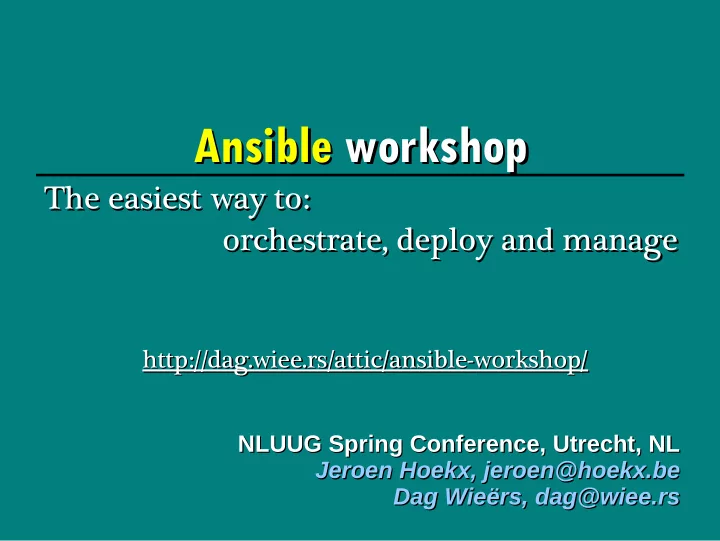

Ansible workshop workshop Ansible The easiest way to: The easiest way to: orchestrate, deploy and manage orchestrate, deploy and manage http://dag.wiee.rs/attic/ansible-workshop/ http://dag.wiee.rs/attic/ansible-workshop/ NLUUG Spring Conference, Utrecht, NL NLUUG Spring Conference, Utrecht, NL Jeroen Hoekx, jeroen@hoekx.be Jeroen Hoekx, jeroen@hoekx.be Dag Wieërs, dag@wiee.rs Dag Wieërs, dag@wiee.rs
Booming project Booming project ● Started in February 2012 Started in February 2012 – Well-defined unique selling proposition Well-defined unique selling proposition – Small auditable codebase (back in the day ;-)) Small auditable codebase (back in the day ;-)) ● Very high activity Very high activity – 700+ unique contributors in first 2 years 700+ unique contributors in first 2 years – Has slowed down when maturing Has slowed down when maturing ● Divers use-cases / userbase Divers use-cases / userbase – large dotcoms, hosting providers, universities, large dotcoms, hosting providers, universities, banks, government agencies, consultants, banks, government agencies, consultants, startups, Open Source projects startups, Open Source projects
Compelling features Compelling features ● Uses SSH, no agent Uses SSH, no agent – Self-bootstrapping, no installation Self-bootstrapping, no installation – No extraneous PKI, uses existing authentication/authorization No extraneous PKI, uses existing authentication/authorization ● Swiss army knife Swiss army knife – parallel execution, provisioning, application deployment, configuration parallel execution, provisioning, application deployment, configuration management, orchestration, use-as-a-library, reporting tool, ... management, orchestration, use-as-a-library, reporting tool, ... ● Complex orchestration made easy Complex orchestration made easy – Simple management language (YAML-based !) Simple management language (YAML-based !) – “ “Infrastructure as data” (not as code !) Infrastructure as data” (not as code !) – Multi-tier management, multi-user Multi-tier management, multi-user ● Core written in python Core written in python – Modules can be in any language, interfaces using JSON Modules can be in any language, interfaces using JSON ● Get started in less than 10 minutes Get started in less than 10 minutes
Buzzword compliant Buzzword compliant ● Privilege escalation ● Multi-user Privilege escalation Multi-user – Power to the people ! – sudo, su, powerbroker, … Power to the people ! sudo, su, powerbroker, … ● Module development ● Idempotency Module development Idempotency – Any language supported by Any language supported by – Not enforced, but advised Not enforced, but advised target (python, powershell) (python, powershell) target ● Orchestration Orchestration ● Transports Transports – Control “when”, “what” Control “when”, “what” – local, ssh, chroot, jail, lxc, local, ssh, chroot, jail, lxc, and “where” and “where” winrm, zone, fireball, winrm, zone, fireball, ● Declarative accelerate, funcd accelerate, funcd Declarative ● Integration Integration – Language limits Language limits – Design allows integration at complexity complexity Design allows integration at various levels various levels
Easy to get running Easy to get running ● Requirements: Requirements: – python 2.6, paramiko/openssh, PyYAML, jinja2 python 2.6, paramiko/openssh, PyYAML, jinja2 ● Run or install from checkout Run or install from checkout – git clone git://github.com/ansible/ansible.git git clone git://github.com/ansible/ansible.git – cd ./ansible cd ./ansible 1. source ./hacking/env-setup source ./hacking/env-setup 1. 2. make install make install 2. ● Install distribution package or make your own Install distribution package or make your own 3. make deb make deb / / make rpm make rpm 3.
Setting up demo environment Setting up demo environment Virtual Box KVM and Libvirt Virtual Box KVM and Libvirt ● Copy ● Copy Copy vm-noname.img vm-noname.img to local to local Copy vm-noname.vmdk vm-noname.vmdk to local disk to local disk disk-store (/var/lib/libvirt/images) disk-store (/var/lib/libvirt/images) ● Create a Host-Only network vboxnet0 Create a Host-Only network vboxnet0 ● Create new VM “vm-master” and use it below Create new VM “vm-master” and use it below ● Create new VM “vm-master” – Use “import existing disk image” but Create new VM “vm-master” Use “import existing disk image” but “Browse local” to vm-master.img “Browse local” to vm-master.img – As a Linux guest using Red Hat (32bit) As a Linux guest using Red Hat (32bit) – As a Linux guest using Red Hat EL6 As a Linux guest using Red Hat EL6 – Use 512MB RAM Use 512MB RAM – Use 1 CPU and 512MB RAM Use 1 CPU and 512MB RAM – Use “an existing virtual hard drive file” Use “an existing virtual hard drive file” – Use the “Virtual network 'default': Use the “Virtual network 'default': (vmdk) (vmdk) NAT” NAT” – Modify the VM to use the created Host- Modify the VM to use the created Host- ● Clone this VM as “vm-web Clone this VM as “vm-web Only network vboxnet0 Only network vboxnet0 ● Clone this VM again as “vm-db” ● Clone this VM as “vm-web” Clone this VM as “vm-web” Clone this VM again as “vm-db” ● Start all VMs ● Clone this VM again as “vm-db” Start all VMs Clone this VM again as “vm-db” ● Start all VMs Start all VMs
Everybody ready ? Everybody ready ? ● During this session: During this session: – Documentation available from: Documentation available from: docs.ansible.com docs.ansible.com – Let us know if you need help Let us know if you need help ● To proceed, log on to To proceed, log on to vm-master using SSH vm-master using SSH – Username: Username: root root / Password: / Password: root root – Go inside Go inside ~/workshop/ ~/workshop/ – Edit the Edit the hosts hosts file file – Use the IP addresses from the other VMs Use the IP addresses from the other VMs
Terminology Terminology ● Inventory Inventory – flat file(s), yaml or custom scripts – flat file(s), yaml or custom scripts – Collection of groups, hosts, variables Collection of groups, hosts, variables ● Modules Modules – scripted in any language, using json – scripted in any language, using json – Offers specific functionality used in tasks Offers specific functionality used in tasks ● Plugins Plugins – python scripts – python scripts – action, callback, connection, filter, lookup, ... action, callback, connection, filter, lookup, ... ● Playbooks Playbooks – yaml description – yaml description – Collection of plays Collection of plays ● Collection of tasks Collection of tasks
Recommend
More recommend